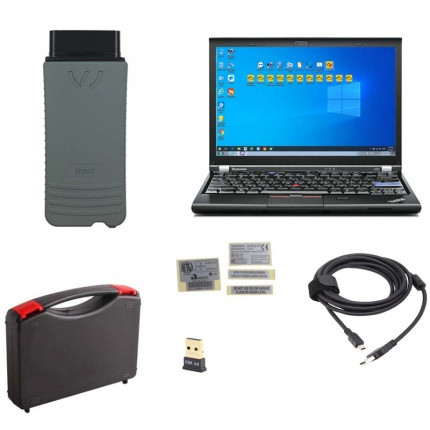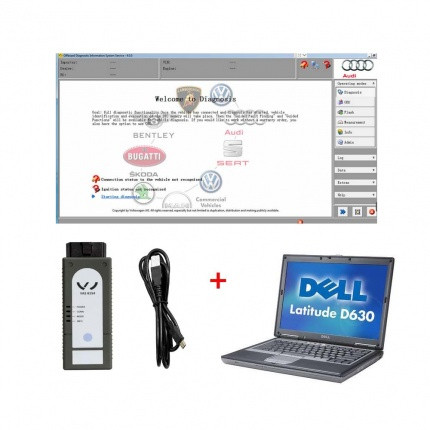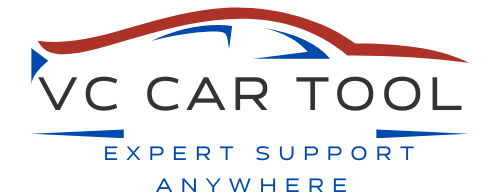Clone VCDS and VAS5054a: Ultimate Guide for Auto Diagnostics
Clone VCDS and VAS5054a interfaces offer affordable diagnostic and coding capabilities for VW, Audi, Skoda, and Seat vehicles, however understanding their differences and limitations is crucial for effective use. This comprehensive guide will explore the intricacies of these tools, enabling you to make informed decisions for your automotive diagnostic needs with VCCarTool’s expert insights. We’ll delve into their communication methods, vehicle coverage, firmware, and programming capabilities, ensuring you choose the right tool for your specific requirements.
1. Understanding the Core Functions of VCDS and VAS5054a Clones
VCDS (VAG-COM Diagnostic System) and VAS5054a are essential tools for diagnosing and coding Volkswagen, Audi, Skoda, and Seat vehicles. While genuine versions offer comprehensive functionality and support, clones provide a more budget-friendly alternative, though with certain limitations. VCCarTool recognizes the need for reliable and affordable diagnostic solutions, offering insights into both VCDS and VAS5054a clones to help you make informed decisions. These tools allow technicians to perform tasks such as reading and clearing fault codes, viewing live data, performing adaptations, and coding control modules, but it’s important to understand the nuances of each device to ensure optimal performance.
2. Key Differences Between Clone VCDS and VAS5054a
While both Clone VCDS and VAS5054a serve the purpose of vehicle diagnostics and programming for VAG vehicles, they have distinct differences that cater to different user needs and technical requirements.
-
VCDS (VAG-COM Diagnostic System): Primarily developed by Ross-Tech, VCDS is renowned for its user-friendly interface and extensive database of vehicle-specific information. It excels in providing detailed coding information for ECU retrofitting, enabling features like steering wheel paddles, keyless entry, and more.
-
VAS5054a: This is a diagnostic interface used with the Offboard Diagnostic Information System (ODIS) software, which is the official diagnostic software used by Volkswagen, Audi, Skoda, and Seat dealerships.
Here’s a comparison table to highlight the key differences:
| Feature | Clone VCDS | Clone VAS5054a |
|---|---|---|
| Software | Uses the VCDS software developed by Ross-Tech. | Works with ODIS (Offboard Diagnostic Information System) software. |
| Functionality | Excels in providing coding information for ECU retrofitting and enabling features. | Primarily used for comprehensive diagnostics, guided fault finding, and online programming with ODIS. |
| User Interface | User-friendly interface with an extensive database of vehicle-specific information. | Interface is more complex and designed for professional technicians in dealership settings. |
| Coding Support | Provides detailed coding information for retrofitting components and enabling features, such as steering wheel paddles, keyless entry, and more. | Coding is primarily done through ODIS online functions, which may require a GeKo account for security access. |
| Firmware | Firmware updates are typically managed through the VCDS software. | Firmware updates are managed through the ODIS software. |
| Communication | Typically connects via USB. Some versions may offer wireless connectivity. | Connects via USB or Bluetooth. |
| Best Use Case | Ideal for enthusiasts and independent mechanics who need detailed coding information and a user-friendly interface. | Suited for professional technicians in workshop environments who require comprehensive diagnostic capabilities and access to online programming functions. |
| Limitations | Clone versions may have limited functionality compared to the genuine VCDS, such as restricted access to certain advanced features or coding options. Compatibility issues may arise with newer vehicle models. | Clone versions may have issues with online programming due to security restrictions and GeKo account requirements. The quality of the clone hardware may vary, leading to potential connectivity or performance issues. |
| Support | Community support is widely available through online forums and VCDS user groups. | Support is generally provided through ODIS software updates and dealer networks. |
| Target Users | DIY enthusiasts and independent mechanics | Professional technicians in workshops and dealerships |
| Ease of Use | Generally easier to use and set up, especially for basic diagnostic tasks | Requires more technical expertise to use effectively, especially for advanced functions like module programming |
| Cost | More affordable than VAS5054a, making it a popular choice for personal use. Contact VCCarTool on WhatsApp: +1 (901) 414 – 1927 for the best deals. | More expensive due to its advanced capabilities and professional-grade features. Contact VCCarTool on WhatsApp: +1 (901) 414 – 1927 for competitive pricing. |
3. Evaluating the Functionality of Clone VCDS
Clone VCDS interfaces are popular among DIY enthusiasts and independent mechanics due to their affordability and ease of use. They allow users to perform a wide range of diagnostic and coding tasks on VAG vehicles.
- Reading and Clearing Fault Codes: Clone VCDS can read and clear diagnostic trouble codes (DTCs) from various control modules in the vehicle, helping identify and resolve issues.
- Live Data Monitoring: Users can monitor real-time data from sensors and actuators, providing valuable insights into the vehicle’s performance.
- Adaptations: Clone VCDS enables users to perform adaptations, which involve adjusting parameters in control modules to optimize vehicle performance or accommodate aftermarket modifications.
- Coding: VCDS is particularly known for its coding capabilities, allowing users to enable or disable certain features, retrofit components, and customize vehicle settings. For instance, you can enable features like cornering fog lights, coming/leaving home lights, or adjust the sensitivity of parking sensors.
4. Diving into the Capabilities of Clone VAS5054a
The VAS5054a is a diagnostic interface used in conjunction with the ODIS (Offboard Diagnostic Information System) software. It is primarily used by professional technicians in Volkswagen, Audi, Skoda, and Seat dealerships for comprehensive vehicle diagnostics, programming, and maintenance.
- Comprehensive Diagnostics: The VAS5054a, when used with ODIS, provides access to a vast database of diagnostic information, including wiring diagrams, repair manuals, and technical service bulletins.
- Guided Fault Finding: ODIS offers guided fault finding procedures, which walk technicians through a step-by-step process to diagnose and repair complex issues.
- Online Programming: The VAS5054a supports online programming, allowing technicians to update control module software, perform immobilizer adaptations, and access other online functions. However, accessing online functions typically requires a GeKo account, which is restricted to authorized dealerships and technicians.
- Module Flashing: The VAS5054a supports module flashing, which involves reprogramming control modules with updated software. This can be necessary to address software bugs, improve vehicle performance, or enable new features.
5. Communication Protocols: USB vs. Bluetooth
Both Clone VCDS and VAS5054a interfaces offer different communication protocols for connecting to a vehicle’s diagnostic port:
- USB: USB connections provide a reliable and stable connection between the diagnostic tool and the vehicle. They offer faster data transfer speeds compared to Bluetooth, making them ideal for tasks that require large amounts of data, such as module flashing or data logging.
- Bluetooth: Bluetooth connections offer wireless convenience, allowing technicians to move freely around the vehicle while performing diagnostic tasks. However, Bluetooth connections may be less stable than USB connections and may have slower data transfer speeds.
6. Vehicle Model Coverage: Which Tool Supports Your Car?
The vehicle model coverage of Clone VCDS and VAS5054a interfaces depends on the software version and the capabilities of the clone hardware.
- VCDS: Generally supports VW, Audi, Skoda, and Seat vehicles from the early 1990s up to the current model year. However, clone versions may have limited support for newer vehicles or require specific software versions to function correctly.
- VAS5054a: Supports VW, Audi, Skoda, and Seat vehicles, as well as some Bentley and Lamborghini models. However, clone versions may have compatibility issues with certain vehicle models or require specific firmware versions to function correctly.
7. Decoding Firmware and PCB Differences
The firmware and PCB (printed circuit board) of Clone VCDS and VAS5054a interfaces can vary significantly depending on the manufacturer and the quality of the clone.
- Firmware: The firmware is the software that runs on the diagnostic interface and controls its functions. Clone versions may have modified or outdated firmware, which can affect their performance and compatibility.
- PCB: The PCB is the physical circuit board that houses the electronic components of the diagnostic interface. Clone versions may have lower-quality PCBs with inferior components, which can lead to reliability issues and reduced performance.
8. Remote Programming: Is It Possible with Clones?
Remote programming, also known as online programming, involves accessing vehicle manufacturer servers to update control module software, perform immobilizer adaptations, and access other online functions.
- VCDS: Does not support remote programming. Coding and adaptations are performed locally using the VCDS software and the diagnostic interface.
- VAS5054a: Supports online programming when used with the ODIS software and a valid GeKo account. However, clone versions may have limited or no access to online functions due to security restrictions and GeKo account requirements.
9. Software Installation and Compatibility: A Step-by-Step Guide
Installing and configuring the software for Clone VCDS and VAS5054a interfaces can be challenging, especially for inexperienced users.
- VCDS:
- Download the latest version of the VCDS software from the Ross-Tech website.
- Install the software on your computer, following the on-screen instructions.
- Connect the VCDS interface to your computer via USB.
- Launch the VCDS software and follow the prompts to register and activate the interface.
- Connect the interface to your vehicle’s diagnostic port and begin using the software.
- VAS5054a:
- Obtain a copy of the ODIS software, either from a legitimate source or from the supplier of the clone interface.
- Install the software on your computer, following the instructions provided.
- Connect the VAS5054a interface to your computer via USB or Bluetooth.
- Configure the software to recognize the interface and select the appropriate diagnostic protocol.
- Connect the interface to your vehicle’s diagnostic port and begin using the software.
10. Common Issues and Troubleshooting Tips
Using Clone VCDS and VAS5054a interfaces can sometimes lead to issues such as connectivity problems, software errors, or incorrect data. Here are some troubleshooting tips to help resolve common issues:
- Connectivity Issues:
- Ensure that the interface is properly connected to the computer and the vehicle.
- Check the USB or Bluetooth connection settings and make sure they are configured correctly.
- Try using a different USB port or Bluetooth adapter.
- Update the interface firmware and software to the latest versions.
- Software Errors:
- Reinstall the software and make sure it is compatible with your operating system.
- Disable any antivirus or firewall software that may be interfering with the software.
- Run the software as an administrator.
- Check the software documentation or online forums for known issues and solutions.
- Incorrect Data:
- Verify that the vehicle information is entered correctly in the software.
- Check the sensor connections and make sure they are not loose or damaged.
- Calibrate the sensors if necessary.
- Consult the vehicle repair manual or online forums for troubleshooting tips.
11. Ethical Considerations: Genuine vs. Clone Tools
While clone tools offer a cost-effective alternative, it’s important to consider the ethical implications of using them. Genuine diagnostic tools are developed and supported by the original manufacturers, who invest significant resources in research, development, and customer support. Using clone tools may infringe on their intellectual property rights and undermine their business model.
Additionally, clone tools may not be as reliable or accurate as genuine tools, which can lead to misdiagnosis, incorrect repairs, and potential damage to the vehicle. It’s important to weigh the costs and benefits of using clone tools before making a decision.
12. Cost Analysis: Is a Clone Worth the Risk?
The cost of Clone VCDS and VAS5054a interfaces can vary depending on the supplier, the quality of the clone, and the included software. While clone tools are typically much cheaper than genuine tools, it’s important to consider the potential risks and limitations.
- VCDS: Clone VCDS interfaces can range from $50 to $200, depending on the version and the supplier. Genuine VCDS interfaces typically cost around $400 to $500.
- VAS5054a: Clone VAS5054a interfaces can range from $100 to $300, depending on the quality and the supplier. Genuine VAS5054a interfaces can cost several thousand dollars.
When evaluating the cost of clone tools, it’s important to consider the following factors:
- Reliability: Clone tools may be less reliable than genuine tools and may have a higher risk of failure.
- Accuracy: Clone tools may not provide accurate diagnostic data, which can lead to misdiagnosis and incorrect repairs.
- Support: Clone tools typically do not come with the same level of support as genuine tools.
- Updates: Clone tools may not receive regular software updates, which can limit their functionality and compatibility.
13. Sourcing Reliable Clones: Where to Buy?
Finding a reliable source for Clone VCDS and VAS5054a interfaces can be challenging, as many suppliers offer low-quality clones that may not function correctly or may contain malware. It’s important to do your research and choose a reputable supplier with a proven track record. VCCarTool can help you find reliable sources and navigate the complexities of the clone market.
Here are some tips for sourcing reliable clones:
- Read Reviews: Check online reviews and forums to see what other users have to say about the supplier and the quality of their clones.
- Check the Warranty: Look for suppliers that offer a warranty on their clones, which can protect you in case of defects or malfunctions.
- Ask for a Demo: If possible, ask the supplier for a demo of the clone before you buy it to ensure that it functions correctly and meets your needs.
- Use a Credit Card: Pay for the clone with a credit card, which can provide you with additional protection in case of fraud or disputes.
14. Future Trends in Automotive Diagnostics
The field of automotive diagnostics is constantly evolving, with new technologies and techniques emerging all the time. Here are some of the future trends to watch out for:
- Artificial Intelligence (AI): AI is being used to develop more advanced diagnostic tools that can automatically identify and diagnose complex issues.
- Cloud-Based Diagnostics: Cloud-based diagnostics allow technicians to access diagnostic data and resources from anywhere in the world.
- Augmented Reality (AR): AR is being used to create interactive diagnostic tools that overlay diagnostic information onto the vehicle in real-time.
- Remote Diagnostics: Remote diagnostics allow technicians to diagnose and repair vehicles remotely, using telematics data and remote access tools.
15. Expert Advice from VCCarTool: Maximizing Your Diagnostic Capabilities
VCCarTool is your trusted partner in navigating the complex world of automotive diagnostics. With our expert advice and comprehensive resources, you can maximize your diagnostic capabilities and stay ahead of the curve.
- Stay Informed: Keep up-to-date with the latest diagnostic technologies and techniques by reading industry publications, attending conferences, and participating in online forums.
- Invest in Training: Invest in training and certification programs to improve your diagnostic skills and knowledge.
- Use the Right Tools: Choose the right diagnostic tools for your needs and budget, and make sure they are properly maintained and calibrated.
- Seek Expert Advice: Don’t hesitate to seek expert advice from VCCarTool or other experienced technicians when you encounter challenging diagnostic issues.
16. Making the Right Choice: VCDS or VAS5054a Clone for Your Needs
Choosing between a Clone VCDS and a Clone VAS5054a depends on your specific needs, technical expertise, and budget.
- Choose Clone VCDS if:
- You are a DIY enthusiast or independent mechanic who needs a user-friendly interface and detailed coding information.
- You want to perform basic diagnostic tasks, adaptations, and coding on VAG vehicles.
- You are on a limited budget and want a cost-effective diagnostic solution.
- Choose Clone VAS5054a if:
- You are a professional technician in a workshop environment who requires comprehensive diagnostic capabilities and access to online programming functions.
- You need to perform advanced diagnostics, guided fault finding, and module flashing on VAG vehicles.
- You have access to a valid GeKo account and the necessary technical expertise to use the ODIS software.
Remember, VCCarTool is here to help you make the right choice and provide you with the resources and support you need to succeed in the world of automotive diagnostics.
Unlock the full potential of your automotive diagnostics with the right tools and expert guidance from VCCarTool. Contact us today on WhatsApp: +1 (901) 414 – 1927 or email us at [email protected] for personalized recommendations and support. Visit our website vccartool.com to explore our wide range of diagnostic solutions and accessories.
 VCDS Diagnostic Interface
VCDS Diagnostic Interface
Navigating the diagnostic tool landscape can be tricky. Let VCCarTool guide you.
 VAS6154 Diagnostic Tool
VAS6154 Diagnostic Tool
17. Frequently Asked Questions (FAQs)
Q1: What is the main difference between VCDS and VAS5054a?
VCDS is primarily used for coding and adaptations, while VAS5054a is used for comprehensive diagnostics and online programming with ODIS.
Q2: Can I use a clone VCDS or VAS5054a for online programming?
Clone versions may have limited or no access to online functions due to security restrictions and GeKo account requirements.
Q3: Are clone tools as reliable as genuine tools?
Clone tools may be less reliable and accurate than genuine tools.
Q4: Where can I buy a reliable clone VCDS or VAS5054a?
Look for reputable suppliers with positive reviews and warranty options.
Q5: What is a GeKo account?
A GeKo account is a security access required for online programming with ODIS, typically restricted to authorized dealerships and technicians.
Q6: Can I update the firmware on a clone VCDS or VAS5054a?
Firmware updates may be available, but it’s important to use the correct update files to avoid damaging the interface.
Q7: What is the best communication protocol for diagnostic tools?
USB connections offer a reliable and stable connection, while Bluetooth connections offer wireless convenience.
Q8: What are the future trends in automotive diagnostics?
Future trends include AI, cloud-based diagnostics, AR, and remote diagnostics.
Q9: What should I do if I encounter issues with my clone VCDS or VAS5054a?
Check the connections, software settings, and consult the documentation or online forums for troubleshooting tips. If problems persist, contact VCCarTool on WhatsApp: +1 (901) 414 – 1927 or email us at [email protected] for expert assistance.
Q10: How can VCCarTool help me with my diagnostic needs?
VCCarTool provides expert advice, reliable sources for diagnostic tools, and comprehensive resources to help you maximize your diagnostic capabilities.
18. Take Action Now: Contact VCCarTool for Expert Assistance
Don’t let diagnostic challenges hold you back. Contact VCCarTool today for expert assistance and unlock the full potential of your automotive diagnostics. Whether you’re choosing between Clone VCDS and VAS5054a, troubleshooting technical issues, or seeking reliable sources for diagnostic tools, we’re here to help.
Reach out to us on WhatsApp: +1 (901) 414 – 1927 for immediate support or email us at [email protected] with your inquiries. Visit our website vccartool.com to explore our wide range of diagnostic solutions and accessories. Let VCCarTool be your trusted partner in navigating the world of automotive diagnostics and achieving success in your repair endeavors. We are available 24/7 to provide guidance and support to our valued customers.

